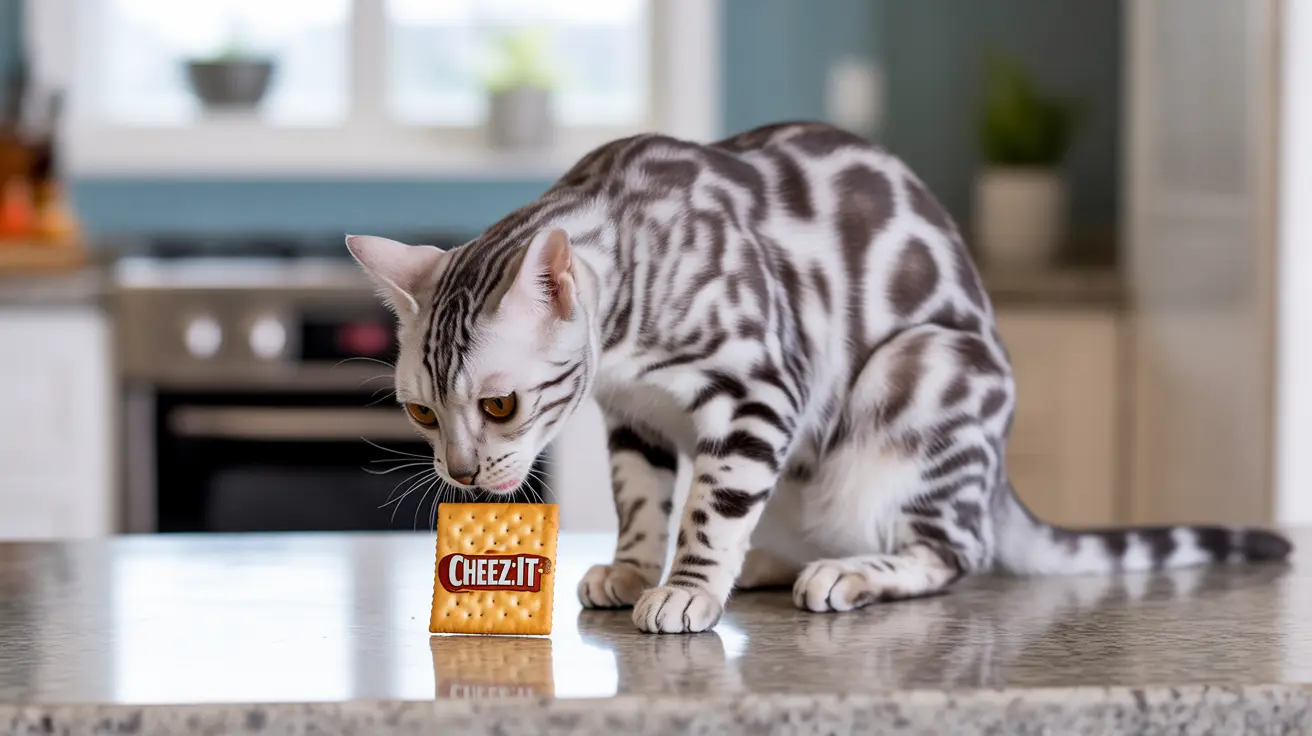If you've ever enjoyed a box of Cheez-Its, you might have wondered whether sharing these crispy, cheesy crackers with your feline friend is safe. While cats may show interest in these popular snacks, understanding their impact on feline health is crucial for responsible pet ownership.
In this comprehensive guide, we'll explore the safety concerns, potential risks, and what you need to know about cats and Cheez-Its. We'll also provide expert recommendations for healthier treat alternatives that better align with your cat's nutritional needs.
Understanding the Ingredients and Nutritional Impact
Cheez-Its contain several ingredients that aren't ideal for feline consumption, including:
- Enriched wheat flour
- Vegetable oil
- Cheese seasoning
- Salt and preservatives
- Various artificial additives
As obligate carnivores, cats require a diet rich in animal protein and specific nutrients that Cheez-Its simply don't provide. One serving contains high levels of carbohydrates, fats, and sodium that can be problematic for cats.
Health Risks Associated with Feeding Cheez-Its to Cats
Short-term Concerns
While not immediately toxic, Cheez-Its can cause several immediate issues:
- Digestive upset
- Vomiting
- Diarrhea
- Increased thirst due to salt content
Long-term Health Impact
Regular consumption of Cheez-Its may lead to:
- Obesity
- Diabetes
- Kidney problems
- Nutritional deficiencies
- High blood pressure from excess sodium
What Happens If Your Cat Eats Cheez-Its?
If your cat manages to sneak a single Cheez-It, there's usually no cause for immediate concern. However, monitor them for any unusual symptoms or reactions, particularly if they have existing health conditions.
Watch for these warning signs:
- Excessive thirst
- Lethargy
- Gastrointestinal distress
- Changes in appetite
- Unusual behavior
Healthy Alternatives to Cheez-Its for Cats
Instead of Cheez-Its, consider these veterinarian-approved treats:
- Commercial cat treats formulated for feline nutrition
- Small pieces of cooked, plain chicken or turkey
- Freeze-dried meat treats
- Specially formulated dental treats
- Small amounts of plain, cooked fish
When to Contact Your Veterinarian
Seek veterinary attention if your cat:
- Consumes a large quantity of Cheez-Its
- Shows signs of distress after eating them
- Has underlying health conditions
- Exhibits unusual behavior or symptoms
Frequently Asked Questions
Can cats safely eat Cheez-Its, and what happens if they eat a small amount?
While one or two Cheez-Its aren't typically dangerous, they're not safe as regular treats. A small amount might cause mild digestive upset, but usually won't require veterinary attention unless your cat shows concerning symptoms.
Why are Cheez-Its not a suitable treat for cats' dietary needs?
Cheez-Its are high in carbohydrates, salt, and artificial additives while lacking essential nutrients cats need. As obligate carnivores, cats require animal-based proteins and specific nutrients not found in these crackers.
What health risks can arise from feeding Cheez-Its regularly to cats?
Regular consumption can lead to obesity, diabetes, kidney problems, and high blood pressure. The high salt content and inappropriate nutritional profile can contribute to long-term health issues.
Are there any Cheez-It ingredients that are toxic or harmful to cats?
While basic Cheez-Its aren't toxic, some flavored varieties may contain harmful ingredients like garlic or onion powder. The high salt content and artificial additives can be harmful, especially in larger quantities.
What are healthier snack alternatives for cats instead of Cheez-Its?
Better alternatives include commercial cat treats, small pieces of cooked plain meat, freeze-dried meat treats, and feline dental treats. These options are specifically formulated to meet cats' nutritional needs.
Conclusion
While Cheez-Its aren't immediately dangerous to cats in tiny amounts, they should never be a regular part of your cat's diet or treat routine. Instead, focus on providing species-appropriate treats that support your cat's health and nutritional needs. Always consult with your veterinarian about the best treat options for your specific cat's situation.






